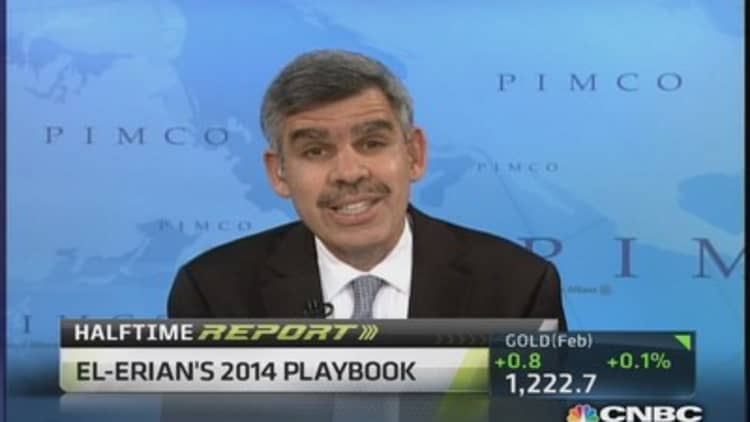U.S. equities face an ironic headwind that will lead them to underperform their global peers next year -- signs of an economic recovery, Credit Suisse said.
U.S. growth prospects are upbeat, the bank said in a note. It forecasts 2014 growth of 2.6 percent in gross domestic product (GDP), with the possibility of surprising on the upside from factors including a possible pick up in government spending, a housing recovery and a potential rise in corporate spending.
These growth forecasts are precisely why it has an underweight call on U.S. stocks.
(Read more: What bubble? We are still buying US stocks: UBS)
"The U.S. equity market is a defensive market," due to the country's high level of corporate and macro policy flexibility, including the relative ease with which companies can lay off workers in a downturn, Credit Suisse said. For that reason, "the U.S. tends to underperform when global growth accelerates."
Non-financial U.S. stocks are trading at a 47 percent premium to global markets on a price-to-book basis, a near-12-year high and well above the historical average of around 30 percent, the bank said.
"This suggests the U.S. market is still trading on a relative 'safe haven' premium. We expect this premium to be priced out of U.S. equities as macro uncertainty continues to fall," it said.
(Read more: Why better US growth may not boost commodities)

Bond yields are also set to rise as the Federal Reserve is expected to begin tapering its purchases of assets as growth improves, another factor typically heralding underperformance by U.S. stocks, Credit Suisse says. As rates rise, the U.S. dollar is likely to strengthen and the bank estimates that every 10 percent rise in the trade-weighted dollar takes 4 percent off U.S. corporate earnings.
It raises its end-2014 target on the S&P 500 to 1960 from 1900, suggesting an around 10 percent rise from current levels.
Credit Suisse is well aware it's making a non-consensus call, noting that sell-side analysts' net buy calls on the U.S. are at a 10-year high.
(Read more: This 'sleeping beauty' is ready to awaken: Amundi)
UBS recently increased its allocation to U.S. stocks, citing expectations U.S. corporate earnings will rise by 8 percent in 2014, driven by solid domestic demand.
In addition, Morgan Stanley is keeping an overweight call on U.S. stocks, setting a target of 2014 for the S&P 500 index for the end of 2014.
"Our logic has been more driven by the lack of a bear case than the strength of the base case," it said in a note. "With a 2 percent dividend yield, a 3 percent net buyback, and mid-single-digit earning growth, calling for a big down market is akin to calling for a double-digit market multiple contraction. We don't think that's likely," it said.
(Read more: US bank stocks could rally 30%: RBC)
To be sure, Credit Suisse isn't alone in its pessimistic view on U.S. stocks. Goldman Sachs is neutral on the market on a three-month horizon, going to underweight on a 12-month horizon.
"Longer term the return potential for the U.S. market is dampened by limited room for valuation and margin expansion given the strong recovery we have seen already," Goldman said in a note. Its end-2014 S&P 500 target is at 1900.
— By CNBC's Leslie Shaffer. Follow her on Twitter: @LeslieShaffer1





